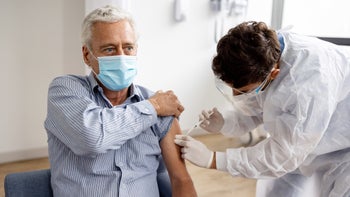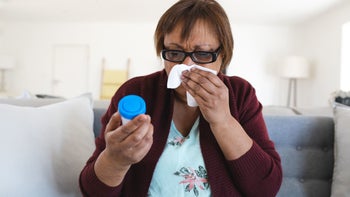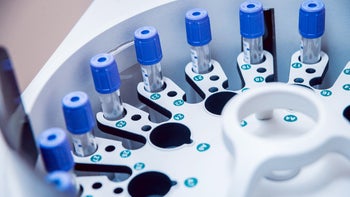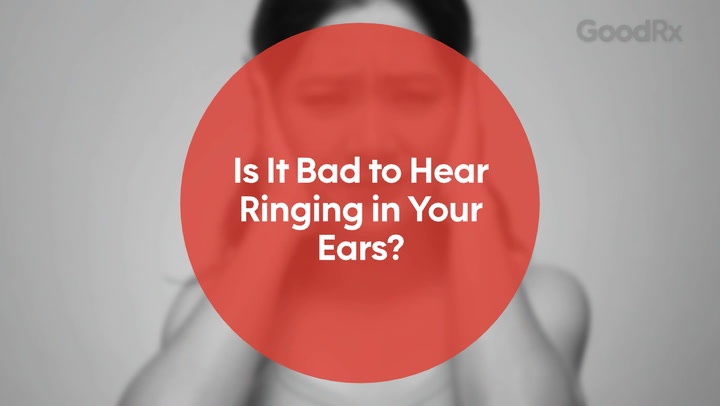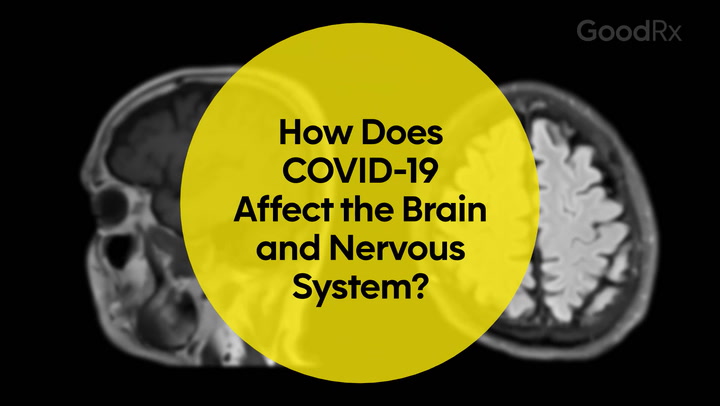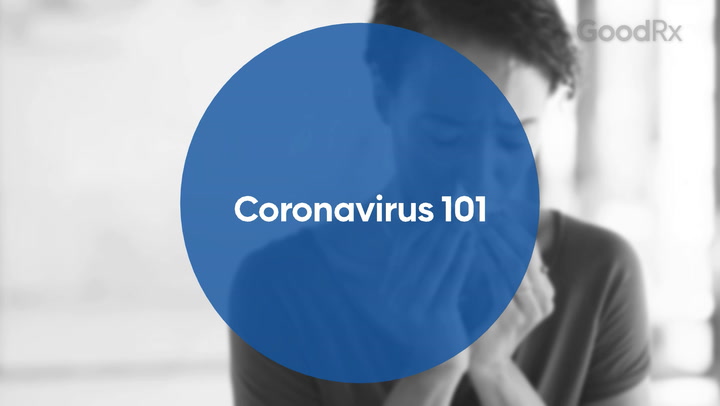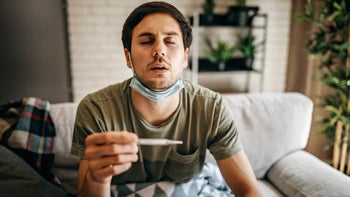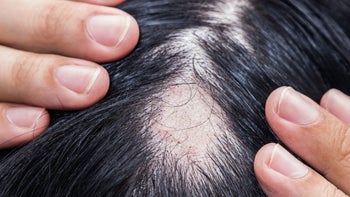
COVID-19 Brain Fog: Duration, Symptoms, Treatment, and More
Key takeaways:
Brain fog causes trouble with attention, memory, and slowed thinking.
COVID-19 brain fog can develop after a person recovers from COVID and can last for months.
There’s no treatment for COVID brain fog. But you can improve symptoms by eating a healthy diet, regularly exercising, and optimizing your mental health.

If you’ve recently recovered from COVID-19 and find yourself taking longer to complete tasks or having trouble thinking through a problem, you’re not alone.
Many people experience brain fog after having COVID-19. In fact, it’s one of the most common symptoms of long COVID. So if you’ve noticed that you’re less alert or having trouble paying attention, it may be a sign you have post-COVID brain fog. Here’s what to expect if you have COVID brain fog and what you can do to improve your symptoms.
What is COVID brain fog?
Studies show that having COVID can trigger brain fog.
Brain fog isn’t an official medical diagnosis. But it’s a popular term used to describe changes in someone’s mental clarity and ability to think or process. People experiencing COVID brain fog can feel like their thinking is slowed or muddled. This makes it harder to make decisions and complete tasks, which can get in the way of work, school, and everyday activities.
People with COVID brain fog may experience symptoms like:
Trouble paying attention or inattention
Short-term memory loss
Trouble concentrating
Difficulty solving problems
Behavior and mood changes
COVID isn’t the only medical condition linked to brain fog. People with other health conditions — like chronic fatigue syndrome as well as people receiving chemotherapy or going through menopause — often experience brain fog, too. But COVID really brought brain fog into the limelight because it’s affected so many people.
What causes COVID brain fog?
It’s not clear why some people develop brain fog after having COVID. But researchers are looking into several theories. Right now, research shows:
The virus that causes COVID-19 leads to inflammation of the brain.
The immune system can go into overdrive during COVID-19 and attack the brain.
COVID-19 can disrupt sleep.
These three things affect how people think and process information — these are key characteristics of brain fog.
And while research is ongoing, newer studies show that COVID-19 can damage brain cells and change how the brain sends and receives signals. These changes are visible in imaging studies that measure brain size and activity. So it’s possible that the virus that causes COVID itself is attacking the brain and the result is a group of symptoms that can be described as brain fog.
How long does COVID brain fog last?
Research shows that COVID brain fog can last for months after a person recovers from the illness. One study showed that people’s symptoms didn’t improve until 9 months after having COVID. This same study showed that many people still had at least five symptoms of brain fog 18 months after they recovered from COVID.
Neurological symptoms, including brain fog, can last longer for some people than others. So while some people may recover within weeks, others may experience brain fog for months.
Is COVID brain fog permanent?
It’s not clear. There hasn’t been enough time to know whether all people recover from COVID brain fog.
While some people recover within a few weeks to months, other people are still experiencing COVID brain fog even almost 2 years later.
What does COVID brain fog feel like?
If you’re not sure if what you’re feeling is brain fog, here’s what COVID brain fog can feel like:
Confusion
Trouble with multitasking
Increased forgetfulness
Increased time to complete tasks
Need to concentrate harder to complete tasks
Trouble remembering details
You might also notice that you:
Feel more tired
Experience headaches
Have trouble sleeping
Get easily annoyed or have a shorter temper
Feel more down than usual
How common is brain fog after COVID?
It’s not clear how many people develop brain fog after having COVID-19. One small study found that about 7% of people developed neurological symptoms after COVID-19 illness. That means, worldwide, tens of millions of people may be experiencing neurological symptoms.
It’s also important to point out that even people with mild COVID-19 symptoms have developed brain fog. In fact, in one study, half of all people experiencing long COVID symptoms also reported brain fog. And most of these people weren’t sick enough to go to the hospital.
COVID brain fog treatment: What should you do if you’re experiencing brain fog?
Experiencing cognitive symptoms can be scary. You might wonder if you’ll ever feel like yourself again. There’s no way to clear these symptoms fast. And right now there’s no medication to treat brain fog.
But the National Institutes of Health (NIH) recently funded a program called RECOVER-NEURO to test whether three treatments can help with COVID brain fog. These include cognitive training programs that have also been used to treat other medical conditions like multiple sclerosis and traumatic brain injuries. The center is also studying a home medical device that uses electric currents for brain stimulation.
Soon, centers will start recruiting participants. You can consider joining a clinical trial, but there are other things you can do to help your COVID brain fog that you can start right now.
There’s evidence that making these changes can help ease COVID brain fog:
Getting enough sleep: Getting enough sleep is one of the best ways to keep your brain and mind sharp. Aim for 7 to 8 hours of uninterrupted sleep. It can help to create a healthy sleep environment and keep to a regular sleep schedule.
Staying active: Exercise improves your physical and mental health. But did you know it also gives your brain a boost? Regular exercise can help improve memory and speed up cognition.
Eating a healthy diet: There’s evidence that the MIND diet can help with memory, cognitive function, and brain health. It’s also wise to avoid substances, including alcohol and tobacco, that can affect how your brain works.
Focusing on mental health: Stress, depression, and anxiety can tax your ability to concentrate and think. It’s important to take care of your mental health if you’re experiencing brain fog. You can work with a therapist or try exercises like yoga, mindfulness, and meditation.
Spending time with friends: Research shows that social interactions make us happier and healthier. Try spending time with friends and family. Or join a new club or group so you can make new friends.
Finding a new hobby: It’s hard to step out of your comfort zone, especially when you don’t feel like yourself. But a new hobby can help you address brain fog. Some hobbies can improve your mental health, and others (like puzzling or games) can boost your memory and processing speed. Plus, a new hobby can help you meet new friends.
Keeping up to date with your medical care: Without treatment, some medical conditions can take a toll on your brain. Work with your primary healthcare provider to make sure you have your other medical conditions under control.
The bottom line
Many people experience brain fog after having COVID, even if they only had mild illness. Symptoms of COVID brain fog include trouble concentrating, impaired memory, and difficulty completing tasks.
Brain fog makes it hard for people to work and hurts their quality of life. There’s no cure for brain fog, but clinical trials looking at treatment options will soon be underway. Things you can do to help ease COVID brain fog include getting enough sleep, eating a healthy diet, and focusing on your mental health.
References
Ali, S. T., et al. (2022). Evolution of neurologic symptoms in non-hospitalized COVID-19 ‘long-haulers’. Annals of Clinical and Translational Neurology.
Asadi-Pooya, A. A., et al. (2021). Long COVID syndrome-associated brain fog. Journal of Medical Virology.
Boldrini M., et al. (2021). How COVID-19 affects the brain. Journal of the American Medical Association Psychiatry.
Ceban, F., et al. (2021). Fatigue and cognitive impairment in post-COVID-19 syndrome: A systematic review and meta-analysis. Brain, Behavior, and Immunity.
Di Liegro, C. M., et al. (2019). Physical activity and brain health. Genes.
Hugon J., et al. (2021). Long COVID: Cognitive complaints (brain fog) and dysfunction of the cingulate cortex. Journal of Neurology.
Jack, S. (2022). Effect of computerized cognitive training in persons with MS. ClinicalTrials.gov.
Krishnan, K., et al. (2022). Multidisciplinary approach to brain fog and related persisting symptoms post COVID-19. Journal of Health Service Psychology.
Mahncke, H. W., et al. (2021). A randomized clinical trial of plasticity-based cognitive training in mild traumatic brain injury. Brain.
National Institutes of Health. (2023). NIH launches long COVID clinical trials through RECOVER initiative, opening enrollment.
Perlis, R. H., et al. (2022). Prevalence and correlates of long COVID symptoms among US adults. Journal of the American Medical Association Network Open.
Umberson, D., et al. (2010). Social relationships and health: A flashpoint for health policy. Journal of Health and Social Behavior.



